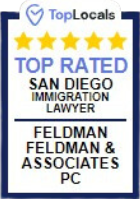The H-1B visa program allows US companies to temporarily employ foreign workers in skilled occupations that require a theoretical or technical skill set. Technology companies, universities, and hospitals are significant users of the H-1B program.
What does this H-1B cap mean for your visa application? As an H-1B visa attorney San Diego applicants depend on, we can explain the cap and its implications in depth. Read on to understand the likelihood of selection, steps to improve your chances, and what happens if you aren’t chosen.
We’re an award-winning San Diego, California, law firm with 50+ years of experience in immigration law.Talk to an immigration attorney at Feldman Feldman & Associates PC by calling 1-619-299-9600 today.

What Is the H-1B Cap?
The H-1B cap refers to the annual limit on standard H-1B visas set by Congress. Each fiscal year (October 1 to September 30), there is a cap of 65,000 new H-1B visas issued to foreign workers in skilled occupations.
An additional 20,000 H-1B visas are available to those who earned a master’s degree or higher from a qualifying US institution. This makes the total H-1B visa cap 85,000 each year.
Once USCIS receives enough electronic applications to meet the cap, they stop accepting new electronic H-1B petitions for that fiscal year.
Petitions received after the final receipt date must wait until USCIS begins accepting applications for the next fiscal year on April 1.
Why Is There an H-1B Cap?
Limits on the annual H-1B visa issuance began to balance industry demands for high-skilled labor with concerns that foreign workers were displacing American ones.
Over time, employers argued the cap was too restrictive. In response, Congress expanded the cap multiple times in the 1990s and 2000s before settling on the current 65,000 standard visas and 20,000 advanced degree exemption system.
As an H-1B visa attorney in San Diego, we regularly help clients navigate the complexities caused by the H-1B cap.
When Does the Cap Impact Applications?
The H-1B cap comes into play when more petitions are received.
USCIS tracks and reports the number of applications against the available H-1B numbers in real time. It is difficult to predict when they will hit or exceed the cap. It has occurred within just five days of the filing window opening in recent years.
Once the cap is reached, USCIS will only accept applications counting toward the exemption for those with advanced degrees in the US. The final receipt date is also announced at this time.
Petitions filed until this final receipt date are entered into the selection process. Those submitted one day later will be denied or delayed until the next fiscal year.
H-1B Cap Selection Process
Because demand for new H-1B visas continually outpaces supply, a random lottery is used to allocate the coveted spots. Here is how it works:
Petition Ranking: Regular Cap Lottery
First, the Regular Cap Lottery is run. All eligible H-1b applicants are entered into the lottery for the 65,000 regular cap places.
Master’s Cap Lottery
The remaining unselected eligible applicants with a Master’s Degree from a qualifying accredited US institution (public or non-profit) are then entered into a lottery for the remaining 20,000 spots.
Notification of Selection
Employers are notified of selection via the MY USCIS portal. They will then have 90 days to file a full H-1b petition. Unfortunately, many applicants each year are not selected in the H-1B lottery.
What Happens If You Aren’t Selected?
Being entered in the lottery does not guarantee selection. With so much demand in recent years, only a percentage of standard H-1B visas ultimately get chosen.
Here is what you can expect if your petition isn’t picked:
-
You will be notified via the My USCIS portal.
-
You miss out on the chance for an October 1 start date in H-1b status.
-
You must wait until the next fiscal year filing window (April 1) for another attempt.
-
You should discuss other immigration options with your immigration attorney, such as a cap-exempt H-1b, STEM OPT, O-1, E-2, direct permanent residency application or other options.
The selection odds may improve or get lower in subsequent years depending on how many applications are filed. But there is no advantage or carry-over benefit for those not initially picked.
Strategies for Improving Odds of H-1B Cap Selection
While the lottery itself is random, there are some strategies employers and foreign workers can employ to improve their chances of being chosen for the annual H-1B cap.
Apply for the Advanced Degree Exemption
Earning a US Master’s, Doctoral, or professional degree boosts your odds substantially over those entering the regular cap pool.
Aim to complete an eligible US academic program well before needing H-1B status. The degree and transcripts will be required to qualify for the 20,000 reserved exemption spots.
File During the Filing Window
The key dates where the electronic registration window is open varies each year. Make sure the employer properly registers for the foreign national in the USCIS portal during the H-1b registration window. The H-1b registration will be open this year from March 6th, 2024 through March 22nd, 2024.
Have a Back-Up Plan
Keep an alternate strategy handy if your H-1B application isn’t selected. Look into other work visas you may qualify for or extend your practical training period.
If feasible, you may want to discuss remote overseas employment options with the petitioning employer so you can still work on critical projects, while pursuing other visa options or waiting to try again next year.
As an H-1B attorney in San Diego, we help clients develop comprehensive plans to address various H-1B visa scenarios.
Other Important H-1B Cap Considerations
Beyond improving selection odds and post-lottery processing, keep these key points in mind:
Cap Exemptions
Those working at higher education institutions, nonprofit entities related to or affiliated with an institute of higher education, and nonprofit or governmental research organizations are not subject to the congressionally mandated H-1B caps.
Additionally, if you already have H-1B status and want to amend the terms with the same employer or change employers, you do not have to worry about the H-1B visa caps, but you will need to file an H-1b petiton with USCIS to reflect this change. You can switch employers under the H-1b portability provisions, and start working with the new employer as soon as the change of employer H-1b petition is received by USCIS.
Cap Gap Automatic Extension
F-1 students working on OPT, whose OPT would expire between April 1 and October 1 of this year, are eligible for a Cap-gap extension of their OPT. This cap-gap extension of the OPT, is a new I-20 that should be valid until September 30th, to bridge the gap between when the OPT would have otherwise expired and the H-1b start date. The foreign national student should request the new I-20 from the school once they receive their H-1b receipt notice. If necessary, they can get an interim OPT extension with just the H-1b selection notice.
Cap Projections
USCIS provides real-time tracking of H-1B petitions against cap limits. Once a sufficient number has been received, they run the lottery.
As an experienced H-1B visa attorney serving San Diego, we closely stay on top of cap trends to assist employers and foreign national clients in the best way possible.
Frequently Asked Questions
1. What Percentage Of H-1b Applications Were Selected In The Lottery For Fiscal Year 2023?
USCIS reported selecting 27% of petitions submitted for the standard 65,000 H-1B visa cap and 63% of those qualifying for the 20,000 advanced degree exemption.
2. Can I Re-Submit My Application Again In The Same Fiscal Year If I Don’t Get Picked In The Lottery?
Unfortunately, no. It would be best to wait until the next fiscal year filing window, beginning April 1 to enter the lottery again with a fresh application. There are no second chances or carry-over advantages for those not selected.
3. Does My Employer Have Better Odds In The Lottery If They File H-1b Petitions For Multiple Employees?
Each foreign worker entered has the same random chance of selection under the H-1B cap.
4. Can My Employer File An H-1b Petition Now Even If I Won’t Start Working For 6 More Months?
Yes, but consult your immigration attorney for filing dates. Be sure to indicate accurately the requested start work date and provide evidence to back this time frame up. Early filing ensures you meet deadlines for cap selection lotteries.
5. What Happens If My Petition Gets Selected But Then Denied Later During Adjudication?
Unfortunately, cap selection is no guarantee that USCIS will ultimately approve your H-1B visa petition, even if the employer and foreign worker meet program criteria. While not common, this does happen, particularly if a case is not filed by a skilled H-1b visa lawyer. It is important to file a complete application that meets all of the regulatory requirements. However, if you do receive an H-1b denial, RFE, or Notice of Intent to Deny, we recommend discussing with an immigration attorney to determine the best path forward.
Connect with an experienced H-1B visa attorney serving San Diego today to discuss your application questions and concerns.
Contact a H-1B Visa Attorney
A complex application process capped by strict annual limitations makes navigating the H-1B program difficult, especially for employers needing to fill critical skills gaps quickly.
Understanding the lottery system, filing strategically, responding thoroughly to evidence requests, and working with an experienced immigration attorney significantly improve your chances of H-1B visa success.
We’re an award-winning San Diego, California law firm with 50+ years of experience in immigration law.Talk to an immigration attorney at Feldman Feldman & Associates PC by calling 1-619-299-9600 today.
A






